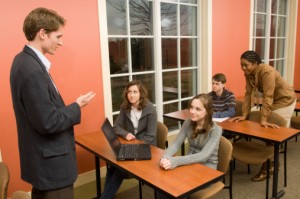Q. What are the big themes of Web 2.0 that will affect the way people learn?
If you think about Web 1.0, when I first became aware of the Internet, I thought of it as the world’s greatest library. I could get information that was hard to find elsewhere. Web 2.0 is making the Internet more a medium of communication, connecting people to other people.

Jeff Livingston
Q. With the advancement of open-source textbooks and Wikipedia as the source of information at schools, some are concerned about the accuracy of information that appears on those sites. Where do you think old models of information archives like the Encyclopedia Britannica fit in?
A. I think the stress around that manipulation of information is the demise of the all-knowing expert. Today, we understand that the crowd is smarter than any individual can be, and I think in general that’s right. We have to prepare students to live in a world that that’s the understanding.
The idea that the Encyclopedia Britannica is codified gospel of all information is gone, and it’s not coming back. Trying to create students that believe [in that source] is doing them a disservice. We have to make them critical consumers of information. Weigh the sources and judge it for themselves based on the quality of the information.
Q. In your experience, how are teachers reacting to using technology in the classroom?
A. One thing we have to remember is if you, the teacher, recently graduated from San Francisco State, you too have lived your life as a digital native. There are definite differences with the generational factor. Some teachers come to the classroom fully prepared to embrace technology and others are slowly testing the waters. But make no mistake about it, everyone is moving toward the digital generation.
Some teachers do have a greater sense of fear than others, but those are the ones who don’t have as much experience with the technology. There are just different levels of comfort.
Q. A lot of schools don’t have access to computers in the classroom. How can teachers take advantage of all the benefits of the web and educational software without having that advantage?
A. There are some places where technology is not as available. But we’re finding that some schools are “have”s, while other schools are “have-more”s. The challenge is using what you have to get to where you want to go.
I’ve seen a lot of partnerships between schools and public libraries, in cases where students don’t have access to computers at home.
But when we say technology, we’re assuming it’s about the computer. We’re not taking into account the power of cell phones, which almost everyone over the age of 16 has. So we’re a lot closer to more access that way.
Q. You’re talking about using cell phones as teaching tools.
A. Yes. I’ll put it this way: my cell phone now has a lot more computing power than my first computer did.
Q. A lot of parents are nervous about kids spending time online unsupervised. What’s your take on that aspect of technology?
A. We’ve seen bad things happen in online environments. But we have to understand that these technologies are just a tool. The technology itself is not bad, the use to which it’s put is. We have to tell kids about appropriate use of the computer without losing value of technology.
We have to recognize that technology is a tool. It’s only people of my generation that think of the computer as an event. But for elementary school students, it’s no more remarkable than a pen. So there’s inherent good or evil in the tool itself.
 Educators must help their students be critical consumers of information. So says Jeff Livingston, Senior Vice President of McGraw-Hill Education Group, where he's responsible for product development and marketing in curriculum areas, including developing Web 2.0 tools and resources.
Educators must help their students be critical consumers of information. So says Jeff Livingston, Senior Vice President of McGraw-Hill Education Group, where he's responsible for product development and marketing in curriculum areas, including developing Web 2.0 tools and resources.

